Posted on November 12th, 2010 by ASEE
 Polar Bear International’s Tundra Connections invites students and teachers to join free live Webcasts on Nov. 15 and 16, 2010, to talk with leading polar bear scientists, zoologists, and educators as they conduct live broadcasts that are informative and educational, focusing on the topics of polar bears and climate change. Visit the PBI Website to learn more about their extensive educator resources.
Polar Bear International’s Tundra Connections invites students and teachers to join free live Webcasts on Nov. 15 and 16, 2010, to talk with leading polar bear scientists, zoologists, and educators as they conduct live broadcasts that are informative and educational, focusing on the topics of polar bears and climate change. Visit the PBI Website to learn more about their extensive educator resources.
Read More
Filed under: For Teachers, Grades 6-8, Grades 9-12, Grades K-5, K-12 Outreach Programs, Web Resources | Comments Off on Webcast: Polar Bear Education. Nov. 15 and 16, 2010
Tags: Environmental science, Live Web Chat, Polar Regions, Web Resources
Posted on September 27th, 2010 by ASEE
 Tech Challenge 2011, sponsored by The Tech Museum, in San Jose, CA, this is an annual team design challenge for youth in grades 5 through 12 that introduces and reinforces the scientific process with a hands-on project geared to solve a real-world problem. This year’s challenge has students devise ways to rid the oceans of trash. Information Clinics begin Sept. 25, 2010, through Feb. 2011.
Tech Challenge 2011, sponsored by The Tech Museum, in San Jose, CA, this is an annual team design challenge for youth in grades 5 through 12 that introduces and reinforces the scientific process with a hands-on project geared to solve a real-world problem. This year’s challenge has students devise ways to rid the oceans of trash. Information Clinics begin Sept. 25, 2010, through Feb. 2011.
Read More
Filed under: Grades 6-8, Grades 9-12, K-12 Outreach Programs | Comments Off on Competition: Trash Design Challenge, San Jose, CA. From Sept. 25, 2010
Tags: Environmental science, Marine engineering, Marine Science, Trash
Posted on September 6th, 2010 by Jaimie Schock
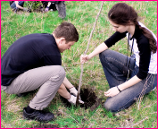 60 freshman at Maryland’s North Harford High School will be the first to join a new Natural Resources and Agricultural Sciences program, spending time outside the classroom in barns, pastures, and fields to learn about farming and the environment.
60 freshman at Maryland’s North Harford High School will be the first to join a new Natural Resources and Agricultural Sciences program, spending time outside the classroom in barns, pastures, and fields to learn about farming and the environment.
Read More
Filed under: K-12 Education News | Comments Off on Science Class in Fields and Forests
Tags: Agricultural, Environmental Engineering, Environmental science, Programs for Students
Posted on June 21st, 2010 by Jaimie Schock
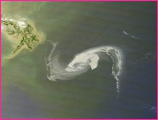 British Petroleum is using a series of dispersants to combat the massive oil spill in the Gulf of Mexico — chemicals intended to break up the surface tension of an oil slick and make oil more water-soluble. But the contents of some of these chemicals may be toxic to humans and wildlife, according to information newly released by the Environmental Protection Agency.
British Petroleum is using a series of dispersants to combat the massive oil spill in the Gulf of Mexico — chemicals intended to break up the surface tension of an oil slick and make oil more water-soluble. But the contents of some of these chemicals may be toxic to humans and wildlife, according to information newly released by the Environmental Protection Agency.
Read More
Filed under: K-12 Education News, Web Resources | Comments Off on Dispersants – a Help or a Hazard?
Tags: Chemical, Environmental Protection Agency, Environmental science, Ocean, Ocean science
Posted on June 7th, 2010 by ASEE
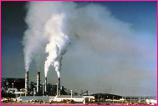 In this lesson from the California Academy of Sciences, students study the effects of pollution upon human health and consider how we can protect ourselves from the effects of carginogens. They build a lung model to learn how their lungs and diaphragm work to make them breathe. The lesson features a demonstration on how incomplete combustion of fossil fuels releases particles into the air that can harm humans.
In this lesson from the California Academy of Sciences, students study the effects of pollution upon human health and consider how we can protect ourselves from the effects of carginogens. They build a lung model to learn how their lungs and diaphragm work to make them breathe. The lesson features a demonstration on how incomplete combustion of fossil fuels releases particles into the air that can harm humans.
Read More
Filed under: Grades 6-8, Grades 9-12, Lesson Plans | Comments Off on Lesson: Pollution and Lung Health
Tags: Environmental science, Human Body, Pollution
Posted on May 24th, 2010 by ASEE
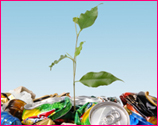 Student teams use the engineering design process to create a useful product of their choice out of recyclable items and “trash.” The class is given a “landfill” of reusable items and allowed a limited amount of bonding materials. The activity addresses the importance of reuse and encourages students to look at ways they can reuse items they would normally throw away. Students are further prompted to consider the problems with growing landfills, and efforts by engineers and others to reduce pollution, emissions, and trash production.
Student teams use the engineering design process to create a useful product of their choice out of recyclable items and “trash.” The class is given a “landfill” of reusable items and allowed a limited amount of bonding materials. The activity addresses the importance of reuse and encourages students to look at ways they can reuse items they would normally throw away. Students are further prompted to consider the problems with growing landfills, and efforts by engineers and others to reduce pollution, emissions, and trash production.
Read More
Filed under: Grades 6-8, Lesson Plans | 1 Comment »
Tags: Engineering Design Process, Environmental Engineering, Environmental science, Grades 6-8, Recycling, Trash
Posted on May 10th, 2010 by ASEE
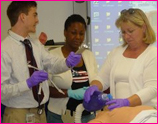 The Aquatic Systems: Emerging Problems and Creative Solutions Institute, University of Florida, July 12-16, 2010, highlights significant research on Florida coastal and inland aquatic systems. Activities include field work and laboratory activities suitable for all classes. The course emphasizes contaminants that affect human and environmental health. Eligibility: Secondary School Science Teachers. Cost: $450. Application Deadline: Not stated, but early registration encouraged. Update to be announced Spring 2011.
The Aquatic Systems: Emerging Problems and Creative Solutions Institute, University of Florida, July 12-16, 2010, highlights significant research on Florida coastal and inland aquatic systems. Activities include field work and laboratory activities suitable for all classes. The course emphasizes contaminants that affect human and environmental health. Eligibility: Secondary School Science Teachers. Cost: $450. Application Deadline: Not stated, but early registration encouraged. Update to be announced Spring 2011.
Read More
Filed under: K-12 Outreach Programs | Comments Off on Teachers’ Summer: Institute on Aquatic Systems. U. Florida, July 12-16, 2010
Tags: Environmental science, Programs for Teachers, Summer Programs (Teachers), Water management
Posted on May 10th, 2010 by ASEE
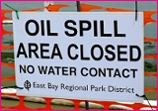 In this lesson, students in grades 3-12 work in teams to analyze an “oil spill” in the classroom, then design, build, and test a system to first contain, and then remove the oil from the water. Students select from everyday items to build their oil containment and clean-up systems, evaluate the effectiveness of their solution and those of other teams, and present their findings to the class.
In this lesson, students in grades 3-12 work in teams to analyze an “oil spill” in the classroom, then design, build, and test a system to first contain, and then remove the oil from the water. Students select from everyday items to build their oil containment and clean-up systems, evaluate the effectiveness of their solution and those of other teams, and present their findings to the class.
Read More
Filed under: Grades 6-8, Grades 9-12, Grades K-5, Lesson Plans | 3 Comments »
Tags: Energy and Environmental Technology, Environmental Engineering, Environmental science, Grades 3-12, Ocean
Posted on May 3rd, 2010 by ASEE
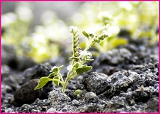 Student at Dallas’s independent Lakehill Preparatory School are enjoying their new $2.2 million Family Environmental Center, the Dallas Morning News reports. The idea for the center came from headmaster Roger Perry after he took noticed a swath of vacant land next to the school’s ball fields. The result is an impressive LEED standards complex that houses three science labs, a large meeting hall, and a retention pond.
Student at Dallas’s independent Lakehill Preparatory School are enjoying their new $2.2 million Family Environmental Center, the Dallas Morning News reports. The idea for the center came from headmaster Roger Perry after he took noticed a swath of vacant land next to the school’s ball fields. The result is an impressive LEED standards complex that houses three science labs, a large meeting hall, and a retention pond.
Read More
Filed under: K-12 Education News | Comments Off on An Empty Lot Sprouts Green
Tags: Environmental science, Green
 Polar Bear International’s Tundra Connections invites students and teachers to join free live Webcasts on Nov. 15 and 16, 2010, to talk with leading polar bear scientists, zoologists, and educators as they conduct live broadcasts that are informative and educational, focusing on the topics of polar bears and climate change. Visit the PBI Website to learn more about their extensive educator resources.
Polar Bear International’s Tundra Connections invites students and teachers to join free live Webcasts on Nov. 15 and 16, 2010, to talk with leading polar bear scientists, zoologists, and educators as they conduct live broadcasts that are informative and educational, focusing on the topics of polar bears and climate change. Visit the PBI Website to learn more about their extensive educator resources.








 Tech Challenge 2011, sponsored by
Tech Challenge 2011, sponsored by  60 freshman at Maryland’s North Harford High School will be the first to join a new Natural Resources and Agricultural Sciences program, spending time outside the classroom in barns, pastures, and fields to learn about farming and the environment.
60 freshman at Maryland’s North Harford High School will be the first to join a new Natural Resources and Agricultural Sciences program, spending time outside the classroom in barns, pastures, and fields to learn about farming and the environment. British Petroleum is using a series of dispersants to combat the massive oil spill in the Gulf of Mexico — chemicals intended to break up the surface tension of an oil slick and make oil more water-soluble. But the contents of some of these chemicals may be toxic to humans and wildlife, according to information newly released by the Environmental Protection Agency.
British Petroleum is using a series of dispersants to combat the massive oil spill in the Gulf of Mexico — chemicals intended to break up the surface tension of an oil slick and make oil more water-soluble. But the contents of some of these chemicals may be toxic to humans and wildlife, according to information newly released by the Environmental Protection Agency. In this lesson from the California Academy of Sciences, students study the effects of pollution upon human health and consider how we can protect ourselves from the effects of carginogens. They build a lung model to learn how their lungs and diaphragm work to make them breathe. The lesson features a demonstration on how incomplete combustion of fossil fuels releases particles into the air that can harm humans.
In this lesson from the California Academy of Sciences, students study the effects of pollution upon human health and consider how we can protect ourselves from the effects of carginogens. They build a lung model to learn how their lungs and diaphragm work to make them breathe. The lesson features a demonstration on how incomplete combustion of fossil fuels releases particles into the air that can harm humans. Student teams use the engineering design process to create a useful product of their choice out of recyclable items and “trash.” The class is given a “landfill” of reusable items and allowed a limited amount of bonding materials. The activity addresses the importance of reuse and encourages students to look at ways they can reuse items they would normally throw away. Students are further prompted to consider the problems with growing landfills, and efforts by engineers and others to reduce pollution, emissions, and trash production.
Student teams use the engineering design process to create a useful product of their choice out of recyclable items and “trash.” The class is given a “landfill” of reusable items and allowed a limited amount of bonding materials. The activity addresses the importance of reuse and encourages students to look at ways they can reuse items they would normally throw away. Students are further prompted to consider the problems with growing landfills, and efforts by engineers and others to reduce pollution, emissions, and trash production. The Aquatic Systems: Emerging Problems and Creative Solutions Institute, University of Florida, July 12-16, 2010, highlights significant research on Florida coastal and inland aquatic systems. Activities include field work and laboratory activities suitable for all classes. The course emphasizes contaminants that affect human and environmental health. Eligibility: Secondary School Science Teachers. Cost: $450. Application Deadline: Not stated, but early registration encouraged. Update to be announced Spring 2011.
The Aquatic Systems: Emerging Problems and Creative Solutions Institute, University of Florida, July 12-16, 2010, highlights significant research on Florida coastal and inland aquatic systems. Activities include field work and laboratory activities suitable for all classes. The course emphasizes contaminants that affect human and environmental health. Eligibility: Secondary School Science Teachers. Cost: $450. Application Deadline: Not stated, but early registration encouraged. Update to be announced Spring 2011. In this lesson, students in grades 3-12 work in teams to analyze an “oil spill” in the classroom, then design, build, and test a system to first contain, and then remove the oil from the water. Students select from everyday items to build their oil containment and clean-up systems, evaluate the effectiveness of their solution and those of other teams, and present their findings to the class.
In this lesson, students in grades 3-12 work in teams to analyze an “oil spill” in the classroom, then design, build, and test a system to first contain, and then remove the oil from the water. Students select from everyday items to build their oil containment and clean-up systems, evaluate the effectiveness of their solution and those of other teams, and present their findings to the class. Student at Dallas’s independent Lakehill Preparatory School are enjoying their new $2.2 million Family Environmental Center, the Dallas Morning News reports. The idea for the center came from headmaster Roger Perry after he took noticed a swath of vacant land next to the school’s ball fields. The result is an impressive LEED standards complex that houses three science labs, a large meeting hall, and a retention pond.
Student at Dallas’s independent Lakehill Preparatory School are enjoying their new $2.2 million Family Environmental Center, the Dallas Morning News reports. The idea for the center came from headmaster Roger Perry after he took noticed a swath of vacant land next to the school’s ball fields. The result is an impressive LEED standards complex that houses three science labs, a large meeting hall, and a retention pond.